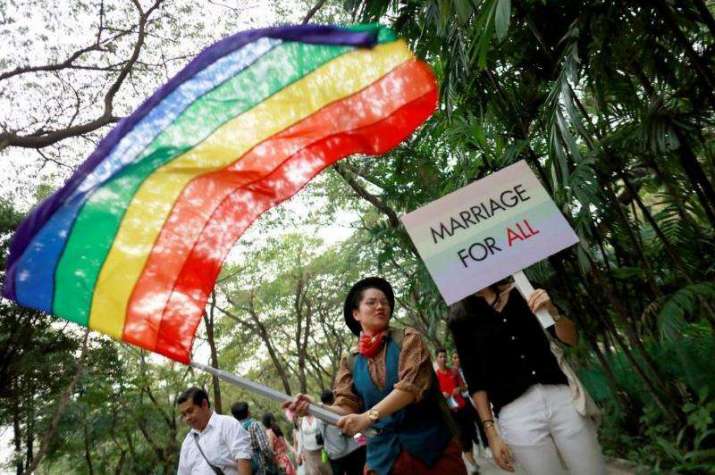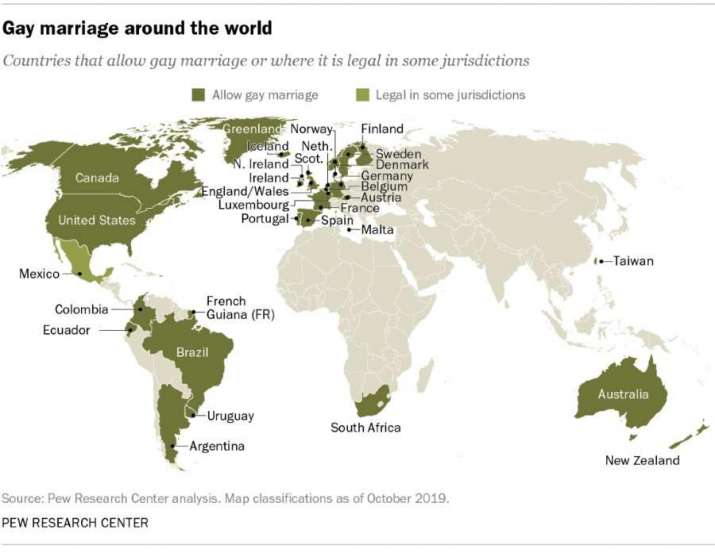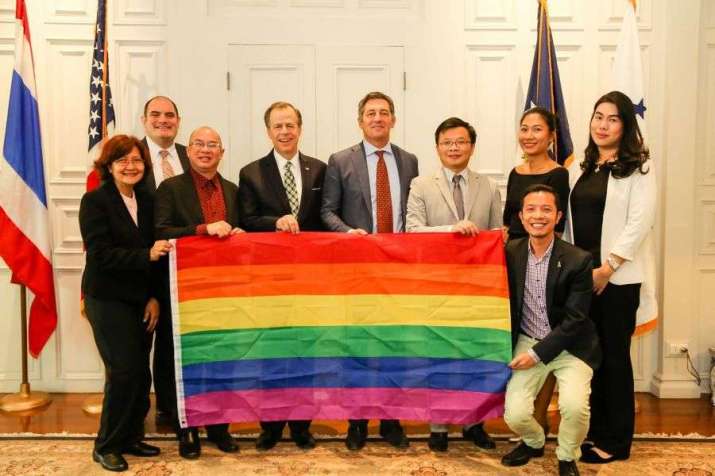NEWS
Thailand Moves to Recognize Same-sex Unions
 A Gay Freedom Day parade in Bangkok, 29 November 2018. From reuters.com
A Gay Freedom Day parade in Bangkok, 29 November 2018. From reuters.comThailand’s cabinet approved a civil partnership bill on Wednesday that would, if passed, recognize same-sex unions with similar legal rights as those granted to married heterosexual couples. The move marks a clearly liberal change for the LGBTIQ community in a nation known to be legally conservative. Importantly, the change would allow same-sex couples to adopt children and enjoy equal rights of inheritance and joint property ownership.
If the bill, which began its journey through the Thai legislature in 2018, is passed by Thailand’s parliament, it would become only the second government in Asia to allow registration of same-sex unions.
Same-sex marriage became legal in Taiwan on 24 May 2019, a week after its parliament passed a bill offering similar protections of marriage to heterosexuals. However, as some have found out in the year since, not all rights granted to heterosexuals made their way into the law. In Taiwan, gay people can only marry foreigners from a country where same-sex marriage is also legal, necessarily excluding partners from all other Asian countries, and they can only adopt children biologically related to at least one of them.
 Gay marriage around the world as of October 2019. From pewresearch.org
Gay marriage around the world as of October 2019. From pewresearch.orgEarlier this year, Bhutan’s Legislative Committee—the lower house of the parliamentary national assembly, approved a bill to officially decriminalize same-sex relationships, though the bill did not move further toward legalizing unions.
In 2018, India struck down colonial-era legislation prohibiting gay sex. Meanwhile, Hong Kong, where Buddhistdoor Global is based, abolished or revised a number of offenses that criminalized sex between men in 2019. Yet in Hong Kong there are still no equal rights for same-sex unions, which campaigners continue to fight for in the courts system. In Japan, gay couples sued the government over the right to legally wed last year.
In 2013, Vietnam decriminalized same-sex weddings but still does not recognize unions as legal. This is despite pressure from several countries in 2019 during a United Nations Human Rights Committee (UNHRC) review.
“The Civil Partnership Bill is an important step for Thai society in promoting equal rights and supporting the rights of same-sex couples to build families and live as partners,” deputy government spokeswoman Ratchada Thanadirek stated on Facebook. (Reuters)
Thailand, known for an extraordinary tolerance of gender expressions, even became a hot spot for global LGBTIQ travelers before the coronavirus pandemic. Nonetheless, the legal framework of the nation, based heavily on ancient Buddhist moral values, has lagged far behind. This conservatism has also presented obstacles to Thai women who have wished to fully ordain as Buddhist monastics, a practice yet to be officially recognized in Thailand.
Kittinan Daramadhaj, president of the Rainbow Sky Association of Thailand, said the bill would essentially allow same-sex couples to marry but stopped short of calling it a “marriage,” which is legally defined as being between a man and woman. “What’s in a name? It’s the content that matters. Civil partnership shouldn’t distract from the fact that it’s about the legal registration of unions.” he said. (Reuters)
Nonetheless, advocates noted that the bill represented a step in the right direction. Kittinan added that if passed, the bill would “sufficiently alleviate pains and support the human rights of LGBT people.” (Reuters)
 From facebook.com
From facebook.comIn 2016, the US State Department’s first-ever Special Envoy for the Human Rights of Lesbian, Gay, Bisexual, Transgender, and Intersex (LGBTI) Persons visited Bangkok. While in Thailand, he met Thai officials and LGBTI civil society leaders, toured the Rainbow Sky Association of Thailand clinic, and spoke with local and regional media about his mission to promote human rights for LGBTI people around the world.
According to a 2015 census, 94.5 per cent of Thailand’s population practices Buddhism. The country’s second-largest religion, Islam, is practiced by 4.29 per cent of the people, predominantly in the south of the country. Christians officially make up just over 1 per cent of the populous. The kingdom has some 40,000 Buddhist temples with almost 300,000 Buddhist monks.
See more
Thai cabinet backs bill allowing same-sex unions (Reuters)
'Happily ever after' eludes Taiwan, a year after Asia's first gay marriages (Reuters)
Related news from Buddhistdoor Global
Rainbodhi, an LGBTIQ Buddhist Community, Launches in Australia
Buddhist Kingdom of Bhutan Nears Decriminalization of Same-sex Relationships
Buddhists Lend Support as Thousands Celebrate LGBT Rights in Seoul
Daughters of Buddhism in Thailand Find Growing Acceptance in the Face of Official Disapproval
Buddhist Temple in Tokyo Offers Graves for LGBT Couples
Related features from Buddhistdoor Global
Call Us By Our Chosen Name
The Active Buddhist: George Takei
Gay Marriage and Buddhism: A Simple Deal














